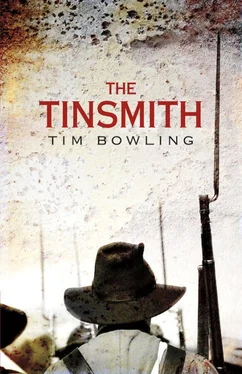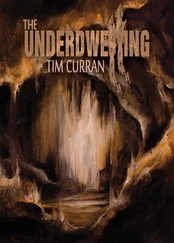But nothing moved or sounded in response. Cautiously, Anson stood and then limped the remaining yards to the tree. As he leaned against the trunk, breathing in rasps, he heard something a little way to his right—a breathing almost as laboured as his own and, in between each breath, the sound of an object being dragged. Pressed hard to the trunk, one hand clasped to his mouth, Anson peered into the grey-black air. Seconds passed. Then a strange shape emerged, the figure of a huge, deformed man dragging a smaller body, its feet bumping over the earth, its head indistinguishable—it might have been a headless corpse.
As Anson stared, poised to defend himself somehow, or to run if necessary, the giant figure stopped almost directly beside him. Slowly he turned his head. Anson stepped back. It was as if the head of the corpse had been propped on the giant’s shoulder. With the two heads now pointed in his direction, Anson suddenly felt his muscles relax. Then he had another surprise—the giant’s slightly bulbous eyes, his clear brow and full mouth, the large scrape on his cheek, were all familiar. This giant was in fact the tall, young soldier from the morning before, the one who had brought so many wounded into the aid station.
“Let me take the other man, soldier.” Anson moved around him to where the dragged figure lay motionless on the ground.
“Thank you, sir.”
The voice was calm, even-tenored—it occurred to Anson that he had not heard the soldier speak before. But then, the din of battle did not leave much opportunity for conversation. Now the pre-dawn stillness carved attention around each word.
“The hospital’s back there.” Anson pointed. “But I should just look at these men before we start.” He bent to the figure on the ground. The uniform was shredded, the bare head small. Blood caked the eyes and bridge of the nose. He was little more than a boy. And he was dead. Probably had been dead for hours. When the tall soldier placed the other man on the ground, the limp body emitted a low groan. At least this one isn’t a corpse, Anson thought, and with a finger he gently probed the gunshot wound in the neck. It might be only a flesh wound, but the loss of blood could be dangerous. This man was middle-aged, stocky, rough-bearded. Anson figured he must be as heavy as an anvil.
“What’s your name, private?”
“Sir?”
“Your name?”
The tall soldier blinked slowly, then said, “John.”
“John? What’s the rest of it?”
Before the soldier could answer, a voice called sharply, “Don’t move!”
Anson turned and saw two soldiers—likely pickets—aiming their muskets at them.
“It’s all right. I’m a surgeon. We’re taking this wounded man to the hospital.” Anson indicated the body lying at the tall soldier’s feet.
The pickets stepped closer. After staring at Anson’s bloody smock, they nodded in unison and withdrew quietly into the last darkness.
“Just the one man, sir?”
Anson sighed. “The other’s dead. A burial party will take care of him. Was he a comrade of yours?”
“No. But I reckoned he’d make it.”
The darkness lifted rapidly. A pink tinge appeared on the horizon of low hills. Anson knew it was foolish to remain in the open. He ordered the tall soldier to take up the wounded man and follow him. Together they crossed the debris-strewn battlefield. Just as they reached the first white cluster of hospital tents near the barnyard, a drum roll rippled through the stillness.
“Baird! Where the hell have you been?”
Rawley’s face was florid, his lips pulled back, revealing his incisors. “I told you not to leave the table! This isn’t your cozy little practice back home.” The blood splattered on his hands and forearms and smeared across his brow explained more than his words why he was so angry. And with a glance at the waiting wounded, Anson realized that every moment he’d been absent was a moment that couldn’t be spared. He turned to tell the tall soldier where to deliver the wounded man, but both the soldier and his burden had moved on and were soon lost among the tents.
“Now that this blasted rain’s stopped, we can go back to operating outside,” Rawley said. “And work fast, dammit. We might be moving out anytime.”
Recovering his instruments from the barn, Anson plunged back into his duty, joining the dozens of surgeons, stewards, and soldiers deputized for hospital detail who scurried about the barnyard, setting up the wrenched doors and oak barrels for surgery. Hours passed in a blur. The day grew warm, then hot. Sweat poured into his eyes, trickled through his moustache and beard. He hardly noticed that the sounds of battle had not resumed. No artillery pounded the earth, though sporadic musket cracks continued through the early morning. At one point, looking up from his table, Anson noticed two soldiers going through one of the viscous stacks of arms and legs. They reached in gingerly, then tossed limbs off to the side. Anson hurried over.
“What are you doing there?”
The men looked up sheepishly. One, corn-haired and freckled, with rubbery lips, immediately lowered his head again. His companion, who wore a beard dark and sharp as a spade under cheeks of a vivid red, spoke up mildly.
“Sorry, sir, it was only Jim’s fancy. He’s got it into his head to have his arm back. You see…”
The man’s embarrassed hesitation irritated Anson. “I can’t see anything if you don’t tell me.”
“Well, it’s this way, sir.” The soldier’s cheeks seemed to drain of colour and immediately flush red again, as if he were continually dying and returning to life. His grey eyes fluttered. “Jim’s a seaman, and the arm he’s missing has his favourite tattoo on it. And Jim, why, he’s afraid if he don’t at least study it a while, he won’t remember it exactly so as to get it made again just right.”
The corn-haired soldier looked up, scowling. “But I don’t see as how he ’spects us to know which one of these is rightly his. You can’t tell the blood from a tattoo nohow.”
“Mebbe we should just pick one,” the bearded soldier said, the red in his cheeks almost reaching his eyes. “Jim’s pretty sick. He might not look hard enough to know the difference.”
Speechless, Anson turned heavily away. Just then, a violent commotion erupted in a near corner of the barnyard. A stocky civilian on a large white charger shouted at Josiah Rawley.
“I have the right to recover my property!” He yanked on the reins, but the more he did so, the more the horse seemed to react to the violence of his words. “And if it’s in that barn, I aim to find out!”
“This is a hospital!” Rawley brandished his amputating knife. “And I am its commanding officer. No man’s going to search for anything here unless I say so.”
“Then say so before I go ahead and do it anyway. I’ve got a government contract here to round up dead horses and I’m going to need all my niggers to get the job done.”
“Well, then, come back when the fighting’s over. As far as I know, neither army’s going anywhere just yet. Your dead horses will stay dead.”
The civilian, a squat man in English riding breeches, glared out from under his slouch hat. He had a scruff of reddish beard, like a tilted crescent moon, running from ear to ear, framing what to Anson was one of the ugliest faces he’d ever seen. The cleft in the chin was dark and thick and gave the whole jaw a cloven hoof quality. The eyes were black and shining, tiny patters of grease. Briefly, the man curled his thin lips back and revealed a pair of sharp incisors. Then, with a curse, he savagely spurred his mount and charged straight at Rawley.
To Anson’s amazement, his superior officer didn’t move out of the way. He simply widened his stance and leaned forward slightly, as if about to whisper a secret. With a wild, pealing neigh, the horse rose up, mud flinging off its hooves. Its rider’s grin almost split his face in two. Anson imagined the top of the skull was about to tear off at any second.
Читать дальше












